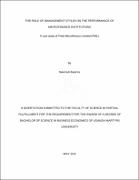The role of management styles on the performance of microfinance institutions
Abstract
The study examined the role of management styles on the performance of microfinance institutions, (MFIs) a case study of Pride Microfinance Limited. The Specific objectives included to establish the impact of Democratic Management Styles on performance of MFIs, establish the Autocratic Management Styles on performance of MFIs and establish the Persuasive Management Styles on performance of MFIs. The study adopted a case study research design using both qualitative and quantitative research paradigms and targeted the employees from Pride Microfinance Limited, sampling a total of 40 (forty) respondents. The study used questionnaires and interviews to collect data which was analyzed and presented in tabular forms as percentage and frequencies, means and standard deviation. The study revealed that leaders consult employees in groups and solicit opinions from them and in decision making and that all stakeholders are involved in identifying the issues and finding solutions to the complex problems. It was also revealed that participation of subordinates develops a sense of confidence among the workers leading to job satisfaction which leads to creativity. Further, autocratic leadership, helps to clarify everyone's roles and responsibilities and that autocratic leaders are able to entice subordinates to perform thereby achieve desired outcomes. It can also be noted that persuasive leadership style focuses on the development of value system of employees, and that subordinates are able to achieve their goals working in the organizational setting. It was also revealed that subordinates are encouraged to be expressive and adaptive to new and improved practices and changes in the environment and that they are able to articulate an appealing vision of the future by communicating ideologies and leading through examples. Finally, recommendations include: leaders should listen to the employees with an open mind and implement an open-door policy. This is because a good leader listens and reacts decisively and in a fair way. This is based on the idea that leaders provide a role model for the critical behaviors they want to see from their followers. It is also recommended that the leadership should improve leadership style by setting examples. That is by “practicing what they preach”


